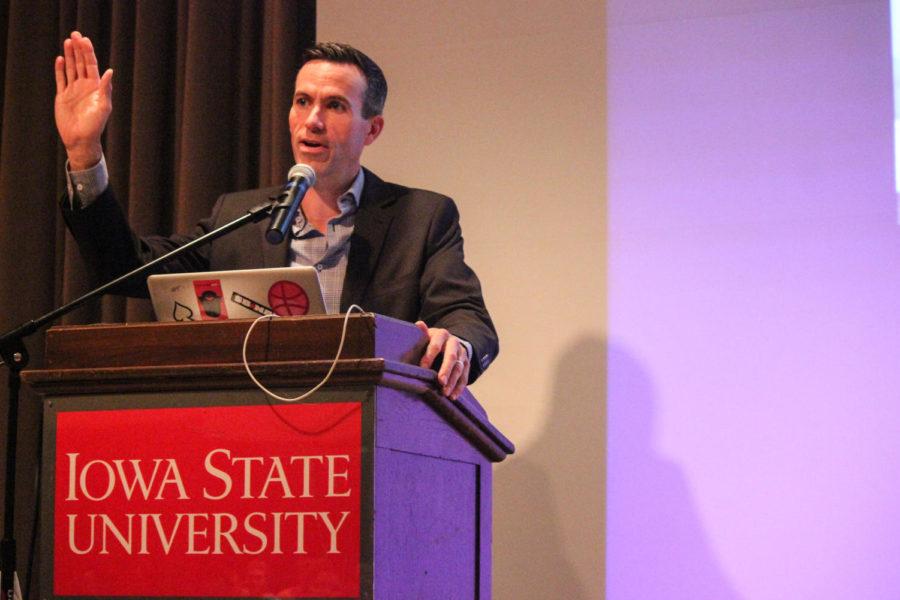LGBTQA athletes face different fears about coming out
October 16, 2014
As students trickled into the Memorial Union’s Sun Room, Adam Guenther, president of the Lesbian Gay Bisexual Transgender Ally Alliance, paced nervously up and down the aisles.
It was a big night for the LGBT community. Cofounder of outsports.com and Nike LGBT Sports Coalition, Cyd Zeigler, was there to speak.
Zeigler first asked for students to tweet at him to keep him updated on the score of the Patriots game. The tone was set casually so students asked questions from the beginning.
This proved to engage the crowd because it gave them a chance to react openly an honestly.
Zeigler then told the story of his personal history in sports.
“I didn’t play basketball in high school because I figured out I was gay and that gay people didn’t belong in basketball,” Zeigler said.
He did run track and cross country.
He then graduated from Stanford and created outsports.com, a website that solely focuses on the stories and aftermaths of athletes of all levels who come out as members of the LGBTQA community.
Zeigler, who has appeared on programs such as ESPN and CNN, helped tell NFL player Michael Sam’s coming out story.
Zeigler considers Sam’s story to be the most important moment in history for LGBTQA athletes.
Sam was praised for his courage and was even endorsed, Zeigler said. So, he challenged the audience, why weren’t there more “Michael Sam’s?” Why is there still fear surrounding coming out?
“Every single athlete that has come out in the last two years, that I know of, has had a positive experience,” Zeigler said.
Tina Hillman, senior in psychology and child adult and family services, said she found it easier to come out and stop hiding that part of herself. She found that not only were her friends and family supportive, but her teammates were as well.
“My teammates are family, and they’ve always supported me,” she said. “They’re very loving and would protect me with their life.”
Zeigler then shared stories closer to Iowa State. He used the University of Iowa as an example.
“One of the things that keeps people in the closet is the language here,” Zeigler said.
He then showed a graph of all the anti-gay language used on Twitter.
“What sucks is that since they started tracking it, the word ‘faggot’ has been used almost 30 million times, compared to ‘no homo’ or ‘dyke’ which have only been used around 8 million times,” Zeigler said. “This is the atmosphere in which these athletes are living in.”
These are the words athletes hear in the locker room, on campuses, from their friends and on social media.
“They call someone a faggot and they don’t really mean ‘I hate gay people.’ The problem is, the gay athlete hears ‘I hate gay people.’ There’s a disconnect,” Zeigler said.
Ziegler also brought focus to how sexism affects athletes.
He then showed a completely pink football locker room.
“This is the visitors locker room at the University of Iowa,” Zeigler said. “When Hayden Fry, a former head football coach, was asked why, he said, ‘Pink is often found in girls’ bedrooms, and because of that some consider it a sissy color.’”
Zeigler went on to say the school has continuously said it is painted pink because it’s a “calming color.” But he later said blue was found to be a more calming color.
He told the audience to put themselves in the guest opponents’ shoes: being in a locker room painted a color deemed sissy while being a gay athlete. The home team’s locker room is not painted pink.
“This is the athletic department and despite being asked over and over again to change it, they just won’t,” he said.
No representatives from Iowa State’s athletic department were at the lecture tonight.
Zeigler addressed this.
“Coaches want to live in a bubble where they don’t have to deal with societal issues,” he said.
However, Hillman, champion of indoor and outdoor shotput, said she knows she’s not the only LGBT athlete in the sports program. She said she thinks Iowa State’s campus is more accepting than other places. Her coach has had safe zone training.
Though Hillman said she also believes some athletes aren’t coming out because there are certain boxes athletes are placed in. She gave the example of being strong and feminine at the same time.
“They don’t have to be antonyms,” she said.
So what does it mean to be an out LGBTQA athlete?
“It means to be fully yourself, not being anyone [other] than who you are,” said Hannah Postlethwait, a sophomore in journalism.







